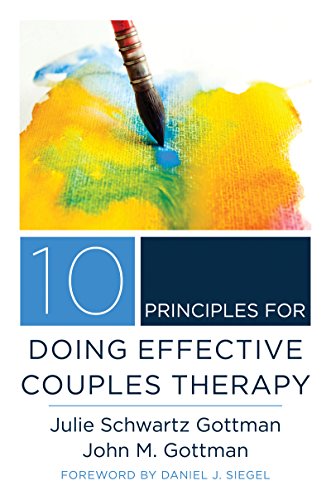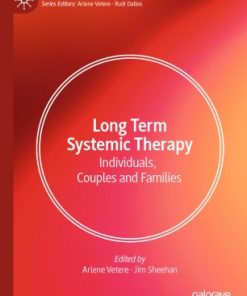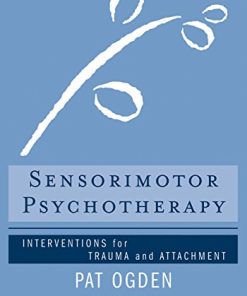10 Principles for Doing Effective Couples Therapy (Norton Series on Interpersonal Neurobiology) 1st Edition, (Ebook PDF)
$50.00 Original price was: $50.00.$25.00Current price is: $25.00.
10 Principles for Doing Effective Couples Therapy (Norton Series on Interpersonal Neurobiology) 1st Edition, (Ebook PDF) – Digital Instant Dowload.
10 Principles for Doing Effective Couples Therapy (Norton Series on Interpersonal Neurobiology) 1st Edition, (Ebook PDF) – Digital Instant Dowload.

Product details:
- ISBN-10 : 0393708357
- ISBN-13 : 978-0393708356
- Author: Julie Schwartz Gottman (Author), John M. Gottman Ph.D. (Author), Daniel J. Siegel M.D. (Foreword)
In 10 Principles for Doing Effective Couples Therapy, two of the world’s leading couple researchers and therapists give readers an inside tour of what goes on inside the consulting rooms of their practice. They have been doing couples work for decades and still find it challenging and full of learning experiences. This book distills the knowledge they’ve gained over their years of practice into ten principles at the core of good couples work.
Table of contents:
Chapter 1: -Renamed from “Assessment and Case Formulation” to “Comprehensive Assessment and Case Formulation.
-Includes a discussion of systemic thinking as it pertains to assessment and evaluation, replaces the section on “Common Mistakes Made in the Evaluation Phase” with “Essential Operations in Assessment, includes a more thorough description of genograms and how to utilize them during assessment, and briefly reviews relationship assessment instruments.
Chapter 2: -Includes a section on confidentiality and ethical concerns in couples therapy, that discusses how to effectively handle ethical issues.
-Also includes a new section on “Providing a Roadmap for Clients”.
Chapter 3: -Renamed from “Balanced Intervention” to “Keeping Therapy Balanced”
Chapter has been revised so that it builds upon the discussion of systemic conceptualization and intervention in the previous chapter.
Chapter 4: -Renamed from “Systemic Intervention” to “Systemic Conceptualization and Intervention”
-Includes a new section on “Enactments,” which are therapist-guided structured interactions that are designed to promote self-sufficient communication by couples.
Chapter 5: -Revised to make it consistent with and building upon previous chapters
-Includes a section on common destructive patterns that couples develop.
Chapter 6: -Will include a new section about “Overcoming Therapist’s Fear of Intensity”. This discussion will integrate principles from the Intersystems approach.
Chapter 7: -Renamed to “Systemic Therapy with Individual Clients”
-Revised the section on Individual Sessions in Conjoint Therapy—part of this discussion will be moved to and expanded upon in the chapter about orienting couples to therapy
Chapter 8: -Chapter renamed to “Working with Highly Reactive Couples” and will incorporate constructs, research, and clinical strategies based on attachment theory and couples therapy interventions that target emotions.
Chapter 9: -Will expand the discussion on fears of intimacy.
-Will include a section on recovering intimacy, along with additional strategies and interventions for recovering intimacy, a discussion on relationship enhancement strategies, and principles from the Intersystems approach.
Chapter 10: -Will remain the same
Chapter 11: -Expand the previous discussion on enactments to include more detailed descriptions of various kinds of enactments and therapist-client dialogue examples.
-New research by Gottman, Fowers, and The Arbinger Institute will be incorporated.
Chapter 12: -Will incorporate techniques from narrative therapy and behavioral couples therapy, and will include recent research from the authors and other on change processes for couples experiencing conflict.
Chapters 13 and 14: -Will remain the same
Chapter 15: -Renamed to “Working with Emotions”
-Will include recent research from attachment theory literature and emotionally-focused couples’s therapy.
Chapter 16: -Renamed to “Homework Assignments: Extending Interventions from the Office to Home”
-Will include additional homework assignments and strategies for facilitating compliance.
Chapter 17: -Renamed to “Treating Infidelity”
-Will introduce a five-phase, empirically supported model of treatment of infidelity developed by the authors.
Title tag
Mastering Relationship Dynamics: 10 Principles of Effective Couples Therapy
Enhance Your Therapy Practice: Interpersonal Neurobiology Techniques for Couples
Building Stronger Bonds: Key Insights from Interpersonal Neurobiology for Couples Therapy
You may also like…
Relationships & Lifestyle - Diet & Nutrition
Long Term Systemic Therapy : Individuals, Couples and Families 1st ed. Edition Arlene Vetere
Erotica - Fiction
Uncategorized
Romance - Contemporary Romance
Medicine - Neurology
Neuroscience for Neurosurgeons 1st Edition by Farhana Akter 1108918468 9781108918466
Medicine - Cardiology












